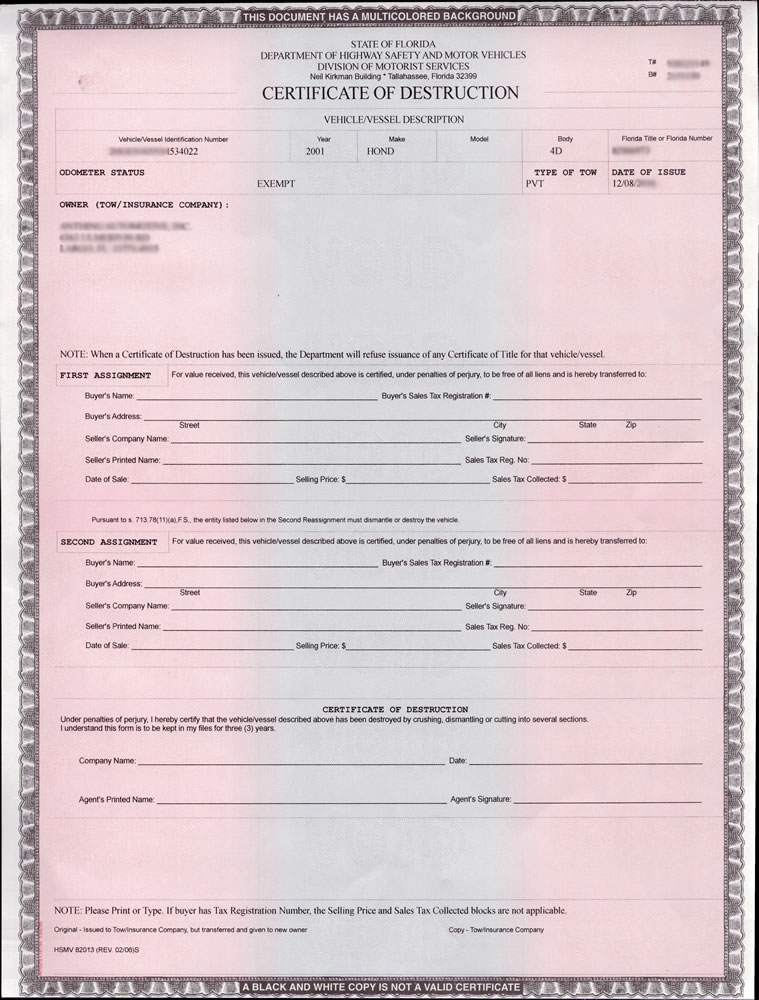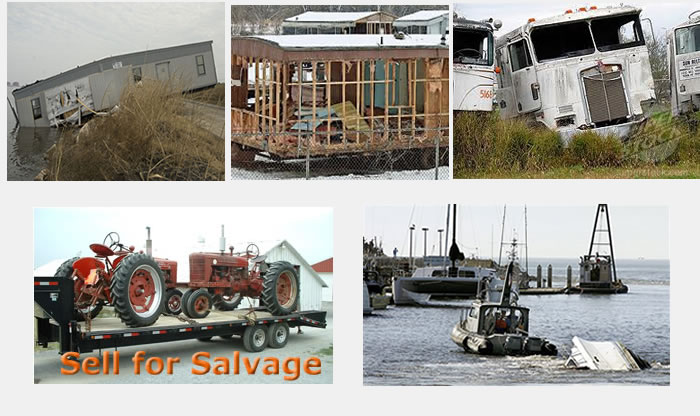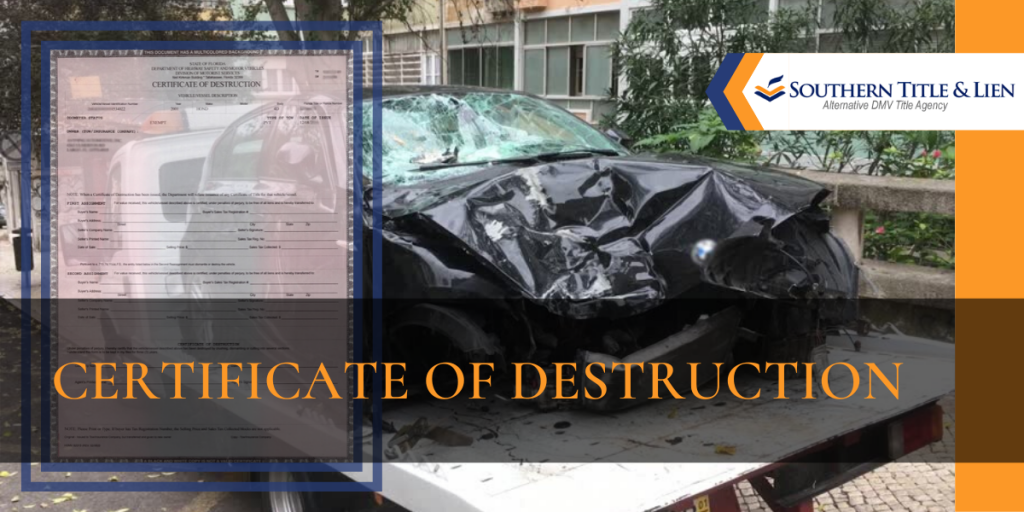Certificate of Destruction: What You Need to Know

A Certificate of Destruction is a legal document issued by the Department of Motor Vehicles (DMV) when a vehicle, mobile home, or vessel is sold for parts or scrap metal. In some states, this is also known as a “Junk” title. It indicates that the vehicle cannot be legally operated on roads and is meant solely for dismantling, parts, or scrap.
Why is a Certificate of Destruction Issued?
-
Total Loss by Insurance:
A vehicle is considered a total loss when the repair costs are 90% or more of its current retail value. At this point, it is usually not cost-effective to obtain a rebuilt salvage title. Vehicles seven model years old or newer with a retail value of at least $7,500 are often issued a Certificate of Destruction if repair costs exceed their market value. -
Older or Lower Value Vehicles:
Vehicles more than seven years old or with a retail value below $7,500 are issued a Certificate of Destruction when their only value is in parts or scrap metal. -
Severe Damage:
Vehicles that are wrecked, burned, or damaged to an extent where they cannot be repaired are given this status.
Other Reasons: - Mobile homes with a retail value of $1,500 or more that have damage costs equal to or greater than 80% of their value.
- Vehicles brought into Florida with titles indicating they are for parts or not repairable.
- Upon request by the registered owner.
Abandoned Vehicles:
Vehicles towed from public or private areas by towing companies that are not claimed and meet specific criteria.
Can a Certificate of Destruction Be Reversed in Florida?
In Florida, reversing a Certificate of Destruction is challenging and can only be done by obtaining a court order. This process typically requires a legitimate reason, such as proving the certificate was issued in error.
-
Insurance or Towing Company Agreement:
In some cases, if the insurance company or towing company that issued the certificate agrees to reverse it, you might be able to pursue legal action to do so.Legal Restrictions:
Vehicles with a Certificate of Destruction cannot be insured, registered, or legally driven. They can only be used for parts, scrap, or to rebuild another vehicle.Reversing a Certificate of Destruction is generally a complex process and often depends on specific circumstances, especially in Florida where it typically requires a court order. However, here are some potential steps or avenues to explore if you’re trying to reverse a Certificate of Destruction:
Ways to Reverse a Certificate of Destruction
-
Contact the Company Listed on the Certificate of Destruction:
Reach out to the insurance company, towing company, or any business entity that originally issued the Certificate of Destruction. They may have the ability to assist in reversing the certificate if it was issued in error or if circumstances have changed. -
Obtain a Court Order:
In Florida, the most common way to reverse a Certificate of Destruction is through a court order. This involves presenting evidence that the certificate was issued incorrectly or under circumstances that justify its reversal. Legal advice or representation may be necessary to pursue this route. -
Seek Insurance Company Agreement:
Contact the insurance company that declared the vehicle a total loss. If they agree to reassess the vehicle’s condition or value, they may be willing to assist in reversing the certificate. -
Prove Administrative Error:
Gather documentation that proves an administrative error was made when the Certificate of Destruction was issued. This could include incorrect damage assessments, valuation mistakes, or clerical errors. -
Vehicle Inspection and Appraisal:
Arrange for a professional inspection and appraisal of the vehicle to demonstrate that it is repairable and worth more than initially assessed. This documentation can be used as evidence in court or when negotiating with the issuing entity. -
Negotiate with the Towing Company:
If a towing company obtained the Certificate of Destruction due to an abandoned vehicle or similar situation, negotiate with them to see if they will agree to reverse it, especially if the vehicle was mistakenly deemed abandoned. -
Explore State-Specific Legal Options:
Research the specific legal requirements and processes in your state for reversing a Certificate of Destruction. Some states may have specific provisions or exceptions that could apply to your situation. -
Consult with a Legal Professional:
Seek advice from a lawyer who specializes in motor vehicle law or title issues. They can provide guidance on the best course of action and assist in preparing the necessary legal documentation and representation. -
Check for Recall or Manufacturer Defects:
If the vehicle was totaled due to a defect or recall issue, check with the manufacturer for possible remedies. This might open the door to having the certificate reversed if the defect is acknowledged and rectified. -
Document All Communications and Efforts:
Keep detailed records of all communications with the insurance company, towing company, and any legal proceedings. This documentation can be crucial in supporting your case for reversing the certificate.
Important Considerations
-
Understand Limitations:
Not all Certificates of Destruction can be reversed, especially if the vehicle is genuinely beyond repair or if legal restrictions are firmly in place. -
Legal Assistance:
Legal assistance is often necessary to navigate the complex process of reversing a Certificate of Destruction. Professional guidance can increase the chances of a successful outcome. -
Costs and Effort:
Be aware that reversing a Certificate of Destruction can be time-consuming and potentially costly, depending on the legal processes and evidence required.
-


For Assistance
If you have purchased a vehicle with a Certificate of Destruction in Florida and need guidance on your options, please contact a FL Licensed Attorney famaliar with this process.


